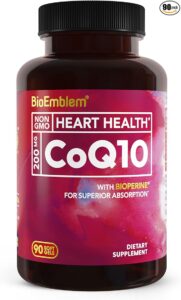CoQ10: Creating Energy in your Body
We all know the necessity of supplements in our diets and especially as we age and our energy levels fall (slightly). We need to ensure we have the full complement of those nutrients which we are unable to produce, or synthesise as well as we could, or are lacking in our diets. One of those is CoQ10; also known as ubiquinone or ubiquinol.
The name sounds as though it’s something that has been manufactured in the local mad-scientist’s basement BUT, CoQ10 is present in all cells and membranes, and helps generate energy in your cells. It also acts as an antioxidant. Your body produces CoQ10 naturally, but its production tends to decrease with age.
It is not considered to be a vitamin because humans and all other animals can make small amounts even without the help of food. Naturally synthesised within the body, it supplies energy to the cells, transports electrons and helps regulate blood pressure levels.
Health conditions like heart disease, brain disorders, diabetes, and cancer have been linked to low levels of CoQ10
Benefits of Coenzyme Q10
- Heart failure treatment
- An improvement in fertility
- Keeping your skin young
- Headache control
- Exercise performance
- Help with Diabetes
- Possibly aids in Cancer prevention
- It’s good for the brain
- Protects the lungs
How Coenzyme Q10 Works
The conversion process of fat and other nutrients to energy in our bodies, requires the presence of CoQ10 and our cells will not function without it.
If you had no CoQ10
- your heart would stop ticking
- your immune system would cease to fight infection
- your muscles would turn to jelly
- your liver would stop cleansing your blood
- your body’s machinery would stop like a car that’s run out of gas.
The importance of eating well
Foods that contain Coenzyme Q10
- organ meats such as liver, kidney, and heart
- beef, sardines, and mackerel … fish!
- spinach, broccoli, and cauliflower
This article (taking control of your diet) will give you a better understanding of dietary requirements.
The Effect of Statins on Coenzyme Q10
If you take Statins (to lower high cholesterol), you may experience some of the side effects from the drug; muscle pain, nausea, diarrhoea. Taking CoQ10 can often minimise these side effects.Statins work by blocking the production of an enzyme HMG-CoA, which is necessary in the synthesis of cholesterol. The problem with this is that HMG-CoA is also a precursor to CoQ10 synthesis. Low levels of CoQ10 are responsible for many of the side effects of statins.Naturally, experts disagree amongst themselves. This article presents both sides of the picture. As does this.In a nutshell, the overall benefits of CoQ10 are that it:▸ Helps lower fatigue and boosts stamina
- Defends against free radicals and typical signs of aging, including muscle loss and skin changes
- Restores the power of antioxidants, including vitamin E and vitamin C
- Stabilizes blood sugar
- Supports healthy gums
- Helps treat the effects of Muscular Dystrophy (click here)
- Helps treat cognitive disorders, including Parkinson’s disease and Alzheimer’s
- Results in metabolic improvement in patients with hereditary mitochondrial disorders
- May be able to help treat other conditions, including cancer, hormone imbalances, diabetes, viruses and infections
Try Doctor’s Best High Absorption CoQ10 120 Softgels … I have used this before and it provides the result you’re after … and increases your HDL levels.
Although not a miracle, the effects of CoQ10 are USUALLY felt throughout the body …
Before you embark on any form of supplementation, please talk to your doctor









